 Petzlover
Petzlover Perro Cimarron is originated from Uruguay but Spanish Mastiff is originated from Spain. Perro Cimarron may grow 27 cm / 10 inches shorter than Spanish Mastiff. Perro Cimarron may weigh 55 kg / 121 pounds lesser than Spanish Mastiff. Both Perro Cimarron and Spanish Mastiff has almost same life span. Both Perro Cimarron and Spanish Mastiff has same litter size. Both Perro Cimarron and Spanish Mastiff requires Low Maintenance.
Perro Cimarron is originated from Uruguay but Spanish Mastiff is originated from Spain. Perro Cimarron may grow 27 cm / 10 inches shorter than Spanish Mastiff. Perro Cimarron may weigh 55 kg / 121 pounds lesser than Spanish Mastiff. Both Perro Cimarron and Spanish Mastiff has almost same life span. Both Perro Cimarron and Spanish Mastiff has same litter size. Both Perro Cimarron and Spanish Mastiff requires Low Maintenance.
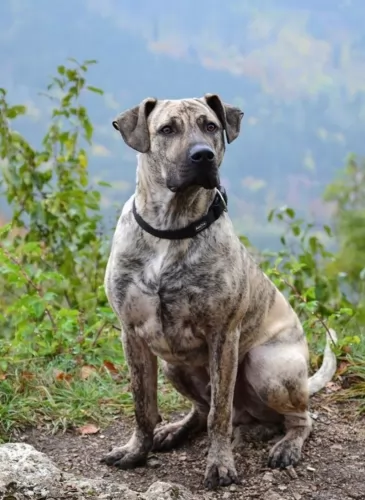 The Perro Cimarron, also known as the Uruguayan Cimarron is a molosser type dog which originated in Uruguay. The dog is believed to have descending from European dogs which were brought to the country by early colonizers.
The Perro Cimarron, also known as the Uruguayan Cimarron is a molosser type dog which originated in Uruguay. The dog is believed to have descending from European dogs which were brought to the country by early colonizers.
These dogs are the official mascot of the National Army of Uruguay. The dog is also recognized in Uruguay as well as by the Federation Cynologique Internationale. The dog was exported to the United States and then recognized by the United Kennel Club in the category Guardian Dog.
 The Spanish Mastiff is a giant breed that comes from Spain. He has always been a guardian dog.
The Spanish Mastiff is a giant breed that comes from Spain. He has always been a guardian dog.
He is an ancient dog breed, in fact dating back to medieval times. He has always been a guardian of livestock, protecting them from attacks from wolves and other predators.
The first breed standard of this pure breed dog was made by the FCI in 1946. A breeding program was also formed for this dog In 1981.
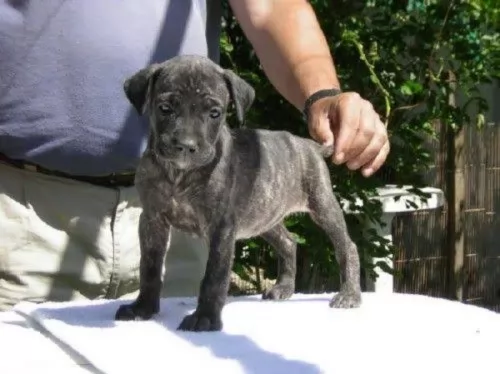 The Perro Cimarron is a large dog standing at between 58 to 61cm and weighing 38 to 45kg, both males and females.
The Perro Cimarron is a large dog standing at between 58 to 61cm and weighing 38 to 45kg, both males and females.
He is a muscular dog with the coat being short and smooth and in a pale fawnish color or brindle and with a black face.
The Uruguayan Cimarron is a multi-purpose working dog but today he is mainly a family companion. This large mastiff type dog is muscular and athletic. He has a large head, the ears are high set and floppy but sometimes they are still cropped and made erect. The tail is thick, low set and reaches to the hock. He has a black nose, brown eyes and a black mask.
Strong, alert, self confident and brave, the Perro Cimarron may not have a particularly friendly face but he loves his human family and is loyal to them. He is calm and cool but even so, he will need to be trained and socialized and then he becomes calm around different people and in different situations. He is a dog that can get on well with children and pets in the home.
 The Spanish Mastiff weighs between 52 and 100kg and the dog’s height is between 72 and 88cm. He has a thick, heavy coat with rustic colors of fawn, black, grey, reddish and yellow as well as brindle.
The Spanish Mastiff weighs between 52 and 100kg and the dog’s height is between 72 and 88cm. He has a thick, heavy coat with rustic colors of fawn, black, grey, reddish and yellow as well as brindle.
He is powerful and muscular with a huge head. The ears are medium length and floppy and the tail is long. If you were looking for a puppy, the American Kennel Club is the only site which has 100% puppies from AKC-Registered litters.
Large, kind, gentle and intelligent, the Spanish Mastiff is well balanced. When you see him you won’t find a dog that is light on his feet and who jumps around excitedly. He is a dignified, intelligent dog, quiet and calm.
Even though he is so calm, it is still a good idea to have him trained and socialized as his very size could be a problem. When you tell him to lie down, you want him to listen to you. This big, gentle giant is devoted to his human family ad takes the role of guardian and protector seriously.
He isn’t suited to life in the city but is better suited to a large property, also because he has a loud bark.
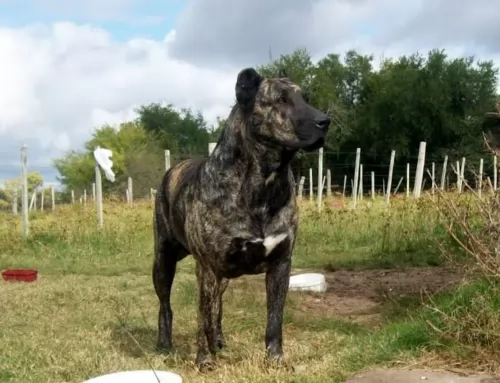 The Uruguayan Cimarron is not looked upon as a pet for the first time dog owner. He is strong willed, stubborn, somewhat aggressive and independent and will require a strong, firm, consistent owner.
The Uruguayan Cimarron is not looked upon as a pet for the first time dog owner. He is strong willed, stubborn, somewhat aggressive and independent and will require a strong, firm, consistent owner.
He will make a loyal, affectionate pet for the person who takes time to socialize and train him. He also makes a good watchdog.
The way any dog breed is brought up will determine how he turns out, and if this particular dog is brought up the right way and given the right amount of care and exercise he needs, he can make as good a pet as any other dog breed.
 Kind, gentle, quietly confident and intelligent are just some of the wonderful characteristics of the Spanish Mastiff.
Kind, gentle, quietly confident and intelligent are just some of the wonderful characteristics of the Spanish Mastiff.
You can add loyalty and devotion to these characteristics too and the fact that he wants to protect you.
Your gentle giant is guaranteed to make you the most wonderful companion and he deserves the very best treatment there is.
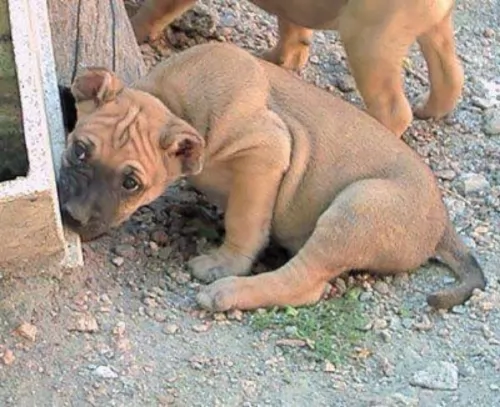 Most dogs, when they are well cared for, don’t get sick often. The Cimarrón is a robust kind of dog but even so he can get any one of the many common dog illnesses there are such as hip dysplasia, bloat, dental disease, cancer, obesity and others.
Most dogs, when they are well cared for, don’t get sick often. The Cimarrón is a robust kind of dog but even so he can get any one of the many common dog illnesses there are such as hip dysplasia, bloat, dental disease, cancer, obesity and others.
This infection can make your dog restless and you will notice your dog trying to wee often but unable to. It can be terrible watching your dog battling, and you will need to get your pet to the vet soon.
Your dog can pick up parasites anywhere such as ticks ad fleas. There are also internal parasites such as tape- and heartworms. They can bring your pet down, making him lethargic and nauseous, so it is best to research canine parasites so you can know what steps to take to protect your dog.
Don’t for one minute think that skin problems are a minor ailment. The pain and itching can drive your dog to despair. The skin can be red, inflamed and oozing. There are so many things that can cause your pet to get a skin allergy and you will need to get him to the vet to get some kind of relief for him.
 It is good to be wise about some of the common dog problems there are that could plague your Spanish Mastiff. Vets are very familiar with these dog illnesses and they tailor their treatment to suit the needs of your dog.
It is good to be wise about some of the common dog problems there are that could plague your Spanish Mastiff. Vets are very familiar with these dog illnesses and they tailor their treatment to suit the needs of your dog.
Remember to get your pet vaccinated against the terrible diseases you get that can kill a dog – rabies, parvo and distemper.
People often think that obesity is something that isn’t dangerous, when in fact it is a serious disease that can cause joint problems, digestive disorders, heart disease, back pain and hip dysplasia.
Dogs rely on water just like what humans do to keep them healthy and functioning properly.
Water is critically important to every organ and also assists with digestion. Your dog is panting and urinating throughout the day and needs to replace the liquid he loses.
Dehydration in dogs results in loss of electrolytes, such as sodium, chloride, and potassium.This is bad as these minerals have important functions.
A dog that is dehydrated has loss of appetite, loss of skin elasticity, is lethargic, has sunken eyes, wants to vomit, has a dry nose and thick saliva. No dog should ever be left without a constant supply of fresh, cool water day and night.
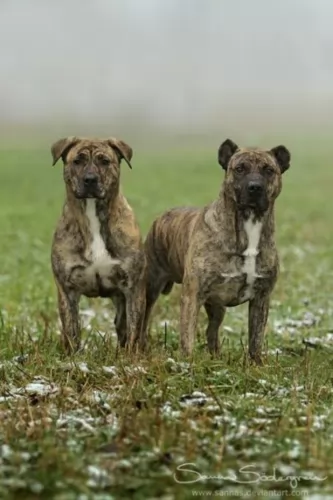 As a high energy, intelligent dog, the Cimarron Uruguayo needs plenty of exercise. He won’t be content to sit around and will be frustrated and even destructive if he doesn’t receive lots of attention and exercise. Daily walks will be imperative as well as other forms of physical and mental stimulation.
As a high energy, intelligent dog, the Cimarron Uruguayo needs plenty of exercise. He won’t be content to sit around and will be frustrated and even destructive if he doesn’t receive lots of attention and exercise. Daily walks will be imperative as well as other forms of physical and mental stimulation.
Your Uruguayan Cimarron is a low maintenance dog because of the short coat which will still require brushing twice a week as he does shed quite a bit. Other forms of grooming include nail clipping, checking the ears and teeth as both of these can become seriously infected if not checked and attended to.
If you have a Uruguayan Cimarron dog as a pet, you will need to be looking at the best food for him as he is large and energetic. There are some excellent commercially manufactured dog foods on the market and you want to be sure that you read the ingredients list so that the food can benefit your pet.
It’s never a good idea to just go on and on feeding your pet kibble. A break every now and again can do your pet the world of good. Some home-made food such as boiled chicken, brown rice or pasta and some cooked vegetables such as sweet potato, carrots and spinach will delight your dog when added into his kibble occasionally. He loves the tasty simplicity of such a diet and will never have to worry about digestive problems.
For such a dog, some raw meat added in from time to time will also do him good. Make sure he always has access to fresh, cool water.
 These are giant breed dogs, so you have to be careful with the way you feed them. Large dogs like these are prone to hip dysplasia so you need to choose a food which has ingredients that work to prevent this disease.
These are giant breed dogs, so you have to be careful with the way you feed them. Large dogs like these are prone to hip dysplasia so you need to choose a food which has ingredients that work to prevent this disease.
You have to be very careful that you don’t overfeed your dog so that the extra weight puts strain on the joints.
This dog will do well with some raw meat added into his diet. Also, include home-made food too. Boiled chicken, brown rice or pasta, sweet potatoes, carrots and spinach chopped up and added to his dry kibble for giant breeds. Added in twice a week can do him the world of good.
A good bush of the thick coat twice a week will keep the Spanish Mastiff looking his best.
The nails will also need to be trimmed regularly to avoid overgrowth and to avoid the nails catching onto things. The ears too should be checked regularly to avoid dampness inside the ear which can cause bacteria.
As a fully grown adult, the Spanish Mastiff isn’t a frisky, frolicking dog but he will still require daily exercise. Options for exercise include long walks, hikes, swimming and ball games.